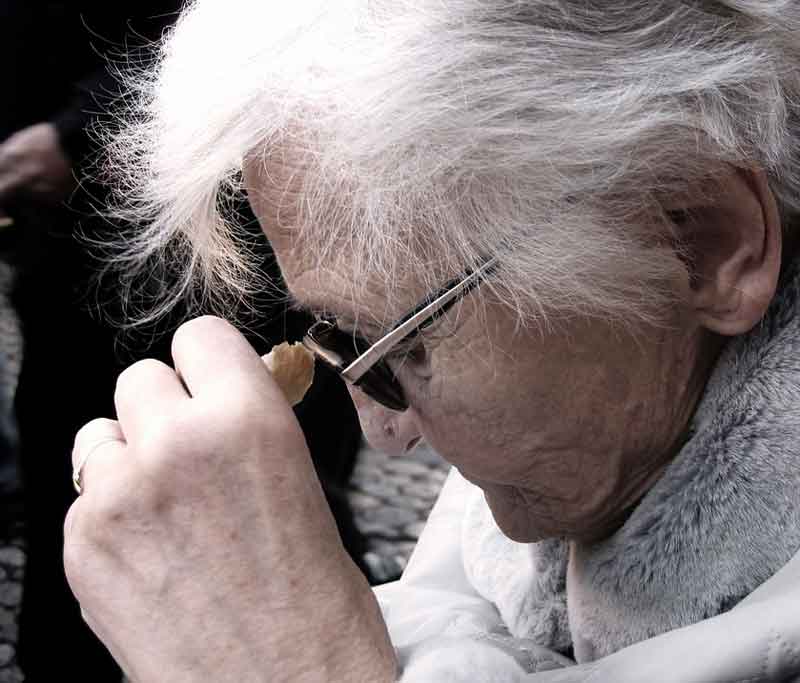
In my mother's home state of Connecticut, already more than 70% of the covid-related deaths are in nursing homes; the share is over 50% in half the states. My mother could have been part of that grim tally.
I could not have lived with her being untouchable. And I could not have borne her death, if this pandemic had claimed her, to have been written off as less tragic for having happened at an advanced age - for being a statistic that fails to value older lives, or recognize the joy that older people can still get from living, and that their living can bring us, their kin, with all that a long experience of life can teach.
My mother died eight years ago. For the last seven years of her life, I visited her every weekend - for two years as she grew frail at my childhood home and for five when she was the mayor of the dining room at a nursing home. I learned from her as a child - about art, literature, women's lib, independence. Even more, in the last years of her life, I learned from her about living.
As I've isolated these months, it is my mother's words that guide me. I hear her voice on an old answering machine, a message she left when her knees kept her inside, as the virus does to so many of us now. "Hello, Louise. This is your mother. Just wait until you see the rhododendron this weekend when you come home. I'm looking at it now, out the window. It's full of pink blossoms. It is so beautiful. Good night."
I think of her as I read commentary on the poor regulatory oversight and insufficient resourcing in nursing homes that would have left her in the dust, to be improperly cared for during a pandemic. I think of the comments that pepper our culture - "I wouldn't want to be a burden," "I want to live a life with dignity."
I hear my mother in her late 80s, still in her house, but no longer able to get out alone. "I just need time to get my helpers," she'd say, laughing. "You know, my false teeth, my glasses, my leg braces, my bandages, my walker." And later, at dinner, as she spooned up chocolate ice cream, "These are the good years."
I recall her words at the nursing home, as I entered the dining room for Saturday lunch. "Loo-eze. Pull up a chair. Come join me and my friends for lunch." Then, to the ladies who could not speak: "Don't you look lovely today. Your sweater is such a nice blue." On a good day, she would get a shy smile in return.
I think of medical ethicists like Ezekiel Emanuel, who suggest life after 75 doesn't merit medical intervention.
Each birthday that my mother celebrated had more meaning than the last, marked with expressions of wonder, joy, and gratitude. "I'm so proud I made it to this age," she said at what would be her last birthday party, her 93rd.
I recall our last dinner, a month later. As we sat around the dining table, a favorite staff member approached. My mother, nearly batting her eyelashes, announced with a grin, "I think maybe I'll marry you." "No, Mrs. Melling," he responded, "I'm going to marry Louise." My mother, brows furrowed, responded, "I don't think so." We laughed as I wheeled her off for bed.
I am fortunate.
My mother always recognized me, she was always conversational. I learned not to care that she didn't know the day of the week or that she thought she'd been a Rockette. I saw her joy when her great granddaughter visited, when the spring flowers were in bloom, when she called my sister to say I'd been promoted.
As spring has turned to summer, I've watched the cyclamen open on my windowsill. I'm thinking of the many ways, were my mother alive, she would have been discarded. With orders that nursing homes take in overflow covid-19 patients from hospitals; with states responding to reports of rampant death by simply granting nursing homes immunity from lawsuits, with the government failing to step in and save lives.
It's hard to understand these policies as anything other than a figurative shrug - "They're going to die anyway." We are a society that systemically does not value the lives of seniors and people with disabilities.
When I was young and my mother was upset, she would sometimes say, with mock hyperbole, "Go ahead, just throw me on the garbage heap."
I'm glad she's not alive to see the trucks pulling up to nursing homes to retrieve corpses. We can do better as we brace for the pandemic's second wave - or more of this endless first wave. We can prioritize PPE for nursing home staff and residents; we can prioritize the health of staff; we can humanely isolate covid-positive residents and those whose status is unknown; we can publish data about nursing home infections to ensure accountability; we can inspect nursing homes, and take action against owners who don't meet safety standards, and we can provide more supports for people to stay in their own homes or smaller nursing homes, where infections do not spread like wildfire.
My mother's name was Frances Melling. I want the countless others like her - seniors and people with disabilities - to be treated not as unavoidable casualties of our war with the covid-19 virus. I want us to fight for their lives, and for all the joys their lives hold for them and us.
My cyclamen is purple and it's beautiful, just like my mother's long life.
(COMMENT, BELOW)
Melling is a lawyer living in Brooklyn.


 Contact The Editor
Contact The Editor
 Articles By This Author
Articles By This Author